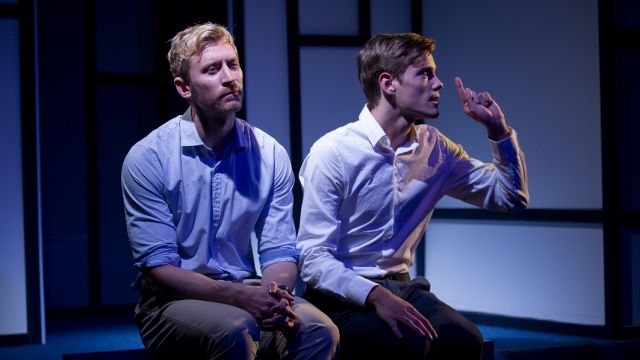Significant Other
What a coup for the New to have snapped up the Australian premiere of Significant Other – a beautifully written play that takes a different, deeper look at the complex relationship between gay men and the women who love them … and what happens when those friendships change. When any friendship changes for that matter … and someone feels left out.
Playwright Joshua Harmon explained, “I think the best way to express a universal experience is to root it in a very specific situation. Jordan is a very specific character and part of that is being gay, but what’s universal is that he feels lonely and wants to be in love.”
“You’ll have a husband, children … I won’t even come close. And I shouldn’t. I wouldn’t want to. It’s just …your wedding is my funeral.”
That’s the universal message of this happy/sad expertly crafted play that brings realism onto a starker, more immediate, exposed stage, where characters are clear, open, and instantly authentic. It’s a stage where director Hayden Tonazzi and set designer Hamish Elliott feel very comfortable. A contemporary stage that talks straight; where the characters identify themselves clearly. A stage they have embraced in a production that is, in so many ways, really stunning.
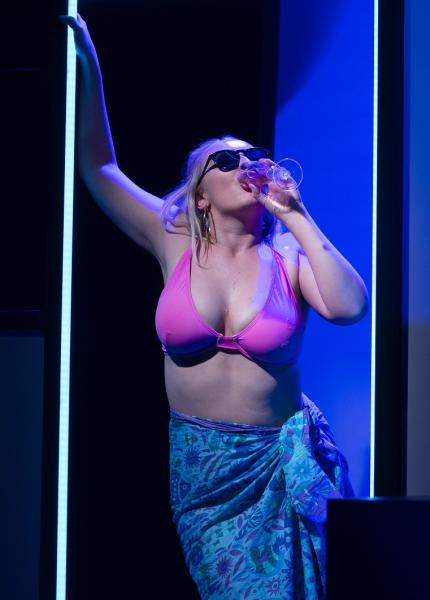
Elliott’s set fixes the play in its time. Coloured, translucent panels framed in black with multiple entries that at times are edged with lights. It’s modern, bright, and practical. It’s set on levels that allow for creative blocking and Morgan Moroney’s innovative lighting effects. Costume designer Kate Beere extends the use of colour in contrasting tones, fabrics and textures. Design wise, this production is clever, upbeat, and totally professional. As is the direction and the acting.
Tonazzi matches Harmon’s writing with sharp, intelligent direction. The characters don’t need lengthy exposition. They hit the stage, instantly identifiable, if a little drunk, at a bachelorette party. Four of them draped over a step, in the middle of boozy, happy reminiscences. Thy speak over each over, lean into each other, every action totally natural and totally believable. And that authenticity is sustained solidly through the ninety minutes of the production.
Tonazzi has assembled a strong cast with whom he has worked carefully to establish their characters and the changing timbre of their relationships – so much so that the rhythm of their dialogue adjusts imperceptively in line with subtle changes in emotion and tension. Joshua Harmon provided the characters and their words. Tonazzi and his five actors give them dimension and truth.
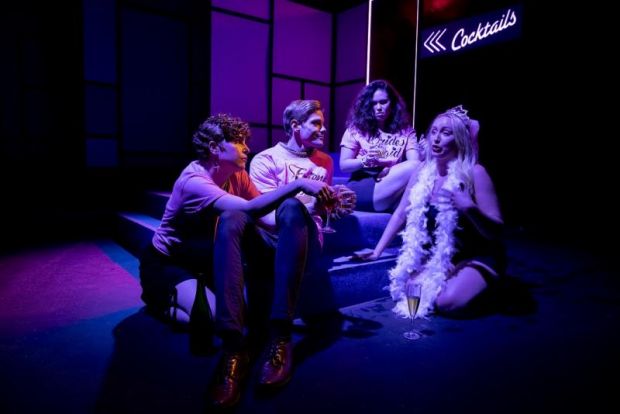
Tom Rogers is Jordan. He inhabits Jordan, feels his highs, covers his lows, but allows the audience to understand every nuance of his complex emotions. There is sustained energy in his performance, a sort of physical restraint that hovers just below the person his friends love and depend on yet is so strong that the audience ‘gets’ him, understands his growing anxieties, feels his fear of being left alone. The Jordan Rogers portrays is loveable, vulnerable, real – especially in the scenes with Helene, his grandmother, played with gentle charm by Helen Tonkin.
These few scenes are very personal, and Tonazzi has set them in a small corner of the set. An easy chair slides into the space. A panel slides open to reveal a shelf and a lamp shedding mellow light on a photograph. Helene enters with Jordan who settles her in the chair, and they talk about the memories the photo stirs, about how Helene is feeling about getting old - about being alone. In those brief moments Rogers and Tonkin establish a plausible closeness that blends perceptive writing, sensitive direction and delicate characterisation. Harmon wrote of these characters:
“This single gay man and this widowed older woman; both go to sleep alone and wake up alone … They almost don’t have the words to connect what they’re sharing.”
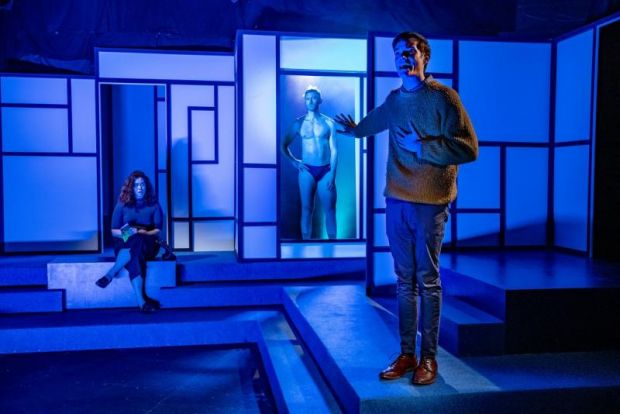
Jordan’s three friends are very different personalities, and Harmon’s dialogue guides both director and actors to create characters who are vibrant, energetic and understanding. Jordan has been part of their lives forever - they accept him, rely on him, but can’t see his special fears.
Kiki, played by Isabella Williams is self-absorbed, a bit kooky, a little over-the-top about everything and Williams finds just the right amount of zaniness to make her cute and a little annoying. She is the first to marry – and the bridesmaids’ dresses Beere finds for her wedding are exactly what Kiki would have chosen!
Vanessa, played by Dominque Purdue, is the next to marry. Purdue finds the more restrained, analytical qualities of Vanessa and this is reflected in her relationship with Jordan. She shares her doubts and reservations. He respects, understands and is always encouraging – even though he identifies with them.

Between Jordan and Laura, played by Laura McInnes, there is a stronger, different bond. McInnes establishes that bond from the very first scene, showing Laura’s special understanding of Jordan in gentle touches, supportive hugs, watchful awareness. They are as close as friends can be, so much so that Laura’s wedding affects Jordan more deeply than he – or she – expects. Tonazzi’s perceptive direction of their final scene together makes it especially moving.
Despite the deep messages in this play, it is quite funny. Rogers underplays those quirky moments expressively– as does Matthew McDonald, who plays the five other male roles, including all three husbands, the other gay guy in the office, and the ‘hunk’ Jordan stalks at the swimming pool. McDonald obviously relishes the challenge of making each character different, appealing, just a little funny and a light contrast to the seriousness that develops as Jordan’s anxiety increases.

Playwrights must find it hard to let a play like this go. When asked about this Joshua Harmon said in an interview:
“Once a play is out in the world, I have to rely on the stage directions in the script and trust that they’ll be handled faithfully.”
No one could have handled this play more faithfully than Tonazzi and his cast and crew. It is a tribute to Harmon – and to a director who looks beyond the words to find the essence of their meaning. The last few moments of the production, where the light lingers on Jordan’s troubled face after he has sung for the bridal waltz at yet another of his friends’ wedding, typifies how Tonazzi, with his creative crew and dedicated cast, have faithfully found that ‘essence’.
Congratulations to the New for finding this gem and Tonazzi for distilling that essence.
Life is simple. You need to find someone to go through it with.
Carol Wimmer
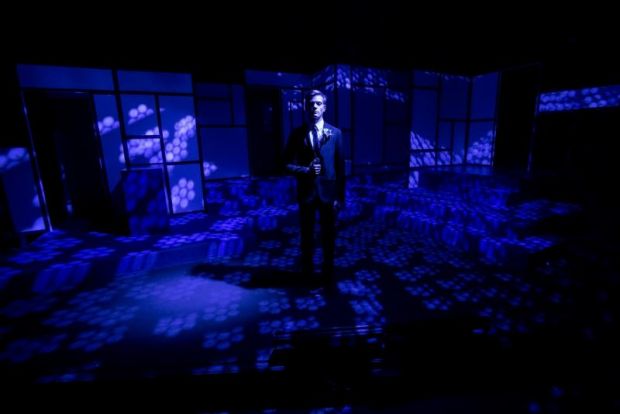
Photographer: © Bob Seary
Subscribe to our E-Newsletter, buy our latest print edition or find a Performing Arts book at Book Nook.

